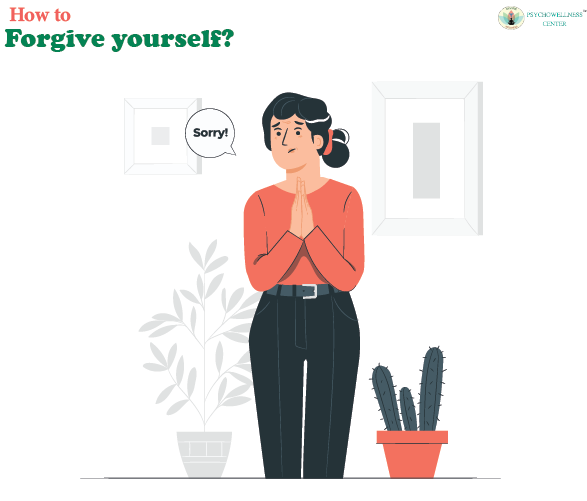The habit of focusing on negative events can increase the stress level of your life and reduce your enjoyment levels. This can cause you to feel resentful, frustrated, and angry. It is essential to learn to adjust, rectify your mistakes, and gain from negative experiences. One of the most important aspects of being successful in this process is being able to accept responsibility for any errors or misdeeds that you’ve made.
Forgiveness is a method by which we can confront the things we’ve done in our past, admit our mistakes and then move on. This does not mean you excuse or condone the events that occurred. This does not mean you will never forget. There’s a time to be in pain and sorrow. We must be able to enjoy this. The season is over and the world is going forward. We must continue to move forward. You can seek help from an Online counsellor to help you move forward in life and work on yourself while forgiving yourself.
How to forgive yourself for previous mistakes
The objective of self-forgiveness is to allow us to continue to move forward in our lives and learn through our failures. When we do not forgive ourselves and persist in self-punishment as well as self-pity, we are not giving ourselves the chance to learn to grow, develop, and live an enriched and meaningful life. The experts in the field of self-forgiveness have suggested that among the important aspects of self-forgiveness is the acceptance that every person is a part of a group that is composed of imperfect people who strive to be the best person they can be. A Counselling psychologist can help in suggesting the importance of forgiveness.
Refusing to forgive yourself would be like having the jury, judge and defendant in your life in one go. We test ourselves frequently and have to write our own sentence of apprehension. The majority of us speak to ourselves, in ways we wouldn’t let anyone speak to our children or our neighbours. However, we aren’t afraid of self-pitying ourselves. The great thing with self-forgiveness is that it allows you to decide whether or not to put into the bench, eject the court and get yourself off the stage.
Strategies for Self-Forgiveness
There are times when you make a mistake that is a challenge to your self-image. It can be difficult to accept yourself when you commit a mistake that is detrimental to yourself or other people. Here are some guidelines on how to practise self-forgiveness internally:
-
Take a moment to reflect. Recall a moment when you felt secure and felt cared about somebody. Consider who that person was: that person could be a family member, friend or relative, teacher, spiritual leader, mentor, or even a pet. Think of the feeling of being with them and feeling safe. Make yourself feel secure. Together with your Online counselor, list your strengths and weaknesses. You can search for the Online counseling.
-
Recall the incident. Then, consider the facts about what you must accept as remorse. Think back to the specific incident and how it affected you. Note what’s hard to accept. Write down the events that occurred and categorise it into three distinct categories: moral faults, unprofessionalism, and everything else. Moral mistakes require regret or guilt, while unprofessionalism requires correction, such as committing to never do a particular action ever again.
-
Don’t avoid guilt. Feeling guilty about something that you’ve done is normal and healthy. If we eliminate the negative feelings that come with doing something the wrong thing, what will we be left with? There is an important distinction between guilt and shame. The latter is characterised by defensive emotions like avoidance, denial and even violence. It’s not a good idea to convince yourself that you are a sinner within and then feel guilt. In doing this you might not believe that you have the ability to make a change. Being a bit embarrassed by your actions will help you avoid repeating the same mistakes again.
-
Be accountable. You can’t accept forgiveness if you don’t admit to the wrong you did to yourself and the person who you’ve offended. Make them aware that you accept responsibility for what you did , and make yourself aware of this as well. Be willing to accept that you were responsible for what you did.
-
Make an effort to fix the damaged. It might be difficult to let yourself go if you think you’ve not done the things you should have done to rectify the situation. Maybe this is giving financial assistance, repairing the property, or offering a sincere apology to someone.
-
Feel empathy for someone other than yourself. It’s been discovered that people have difficulty with self-forgiveness when they feel empathy for the other person involved. It’s normal to feel apprehensive about this. If you’re not able to feel empathy for both you and another person, self-forgiveness may be empty and meaningless.
Get help
Self-acceptance is the goal you’d like to achieve. Self-acceptance encompasses more than self-forgiveness. It refers to a position towards our lives and to ourselves. Self-acceptance is essentially realizing that we all are loved and have legitimate motives for acting in a particular way. Self-acceptance generally is a part of cultivating compassion for yourself and others.
Have tried to forgive yourself, but were stuck in the process? Self-forgiveness therapy could aid. A variety of psychological treatments performed by top psychologists in India can assist you in engaging in the process of self-forgiveness. For example, self-forgiveness CBT and self-forgiveness online counselling. In CBT schema-based CBT as well as compassion-focused CBT you can practice techniques to aid you in dealing with feelings of shame or guilt and build self-compassion.
If you’re searching for the most effective “Psychologist near me“, contact TalktoAngel the best Indian psychotherapy platform.

